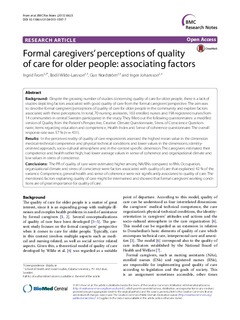| dc.description.abstract | Background Despite the growing number of studies concerning quality of care for older people, there is a lack of studies depicting factors associated with good quality of care from the formal caregivers’ perspective. The aim was to describe formal caregivers’ perceptions of quality of care for older people in the community and explore factors associated with these perceptions. In total, 70 nursing assistants, 163 enrolled nurses and 198 registered nurses from 14 communities in central Sweden participated in the study. They filled out the following questionnaires: a modified version of Quality from the Patient’s Perspective, Creative Climate Questionnaire, Stress of Conscience Questionnaire, items regarding education and competence, Health Index and Sense of coherence questionnaire. The overall response rate was 57 % (n = 431). Results In the perceived reality of quality of care respondents assessed the highest mean value in the dimension medical-technical competence and physical technical conditions and lower values in the dimensions; identity-oriented approach, socio-cultural atmosphere and in the context specific dimension. The caregivers estimated their competence and health rather high, had lower average values in sense of coherence and organizational climate and low values in stress of conscience. Conclusions The PR of quality of care were estimated higher among NA/ENs compared to RNs. Occupation, organizational climate and stress of conscience were factors associated with quality of care that explained 42 % of the variance. Competence, general health and sense of coherence were not significantly associated to quality of care. The mentioned factors explaining quality of care might be intertwined and showed that formal caregivers’ working conditions are of great importance for quality of care. | nb_NO |

